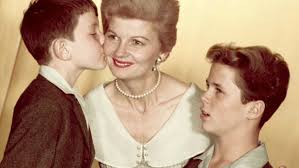Sarah Josepha Hale—who remembers her? Actually, we all do, indirectly, for two reasons. One is our annual Thanksgiving on the fourth Thursday of November. The second I’ll get to later.
Even without Thanksgiving, she left her mark on American history, largely by having the sense to look  around her, take stock of what she had, and be grateful for it. In time she gave hundreds of American women reason to be grateful too.
around her, take stock of what she had, and be grateful for it. In time she gave hundreds of American women reason to be grateful too.
A girl growing up in the early days of the 19th century didn’t have too many options, even in forward-looking, erudite New England. A smattering of education, if she was lucky. A considerate husband, if luckier still. Healthy children who lived past their infancy—jackpot. Though Sarah later wrote little about her father, she credited her mother with a strong mind and her Dartmouth-educated older brother with sharing some of his instruction. The rest of her education was the Bible and classical English authors, the base from which she started her own school for ladies in Newport, New Hampshire. A smattering of education? Check.
By all accounts, she scored well in the considerate husband department too. David Hale, a moderately successful lawyer, shared books with her and encouraged her to write for the local paper. In between babies, of course. So she was doing well with intellectual stimulation, spouse, and progeny—until her husband suddenly died, “as with a stroke,” mere days before the birth of their fifth child.
A widow’s options in 1822 were even narrower than a young girl’s. But if Sarah Hale had no funds she did have connections, and after a failed business or two she accepted the offer of an Episcopal clergyman to help start a women’s journal. The Ladies’ Magazine, published in Boston, had its ups and downs, but caught the attention Louis A. Godey, a Philadelphia publisher who was looking to mine the untapped reserves of the women’s market. He asked Mrs. Hale to come on board for a new venture, to be titled Godey’s Lady’s Book and American Ladies’ Magazine. The cumbersome second phrase was soon dropped, and Godey’s Lady’s Book became the voice of American women for the next fifty years.
Sarah had two conditions: first, rather than borrow (or steal) material from other journals, especially overseas, she wanted to develop the talents of American writers by publishing and paying them well. Second, she didn’t like fripperies or “high fashion”; her journal should be as high-minded as the editor. Mr. Godey was fine with paying extra for good writing, but his business sense checked her puritan tendencies. Women were interested in fashion, had always been interested in fashion, and always would be interested in fashion. Hence, the painstakingly hand-colored “fashion plates” that decorated each number of Godey’s. Sarah may have fumed, but got in her own licks by fulminating against tight corsets and encouraging women to pursue fresh air and exercise.
As the first successful women’s magazine ever, Godey’s Ladies’ Book used its popularity to do good while doing well—for instance, offering the first retail shopping service. Every issue featured items women could purchase to be delivered directly to them, prefiguring the mail-order catalogue, which in turn prefigured Amazon.com. While making money for the business, Sarah Hale used her influence to lobby for educational opportunities for women, including college, business schools, and normal schools (for training teachers).
She was very canny in the way she went about it, though: rather than castigating men for holding the fair sex back, she played to their interests: wouldn’t a husband come to appreciate a wife informed enough to share his business concerns? Don’t all fathers want their children to benefit from an educated mother? And if a woman chooses not to marry, it’s silly to think she will squeeze men out of their chosen professions. Elizabeth Blackwell, the first American woman to achieve a medical degree, owed much of her support to Sarah Hale, as did the Female Medical School of Philadelphia and the Ladies’ Medical Missionary Society.
 She always said—and sincerely believed—that a woman’s chief place was in the home, but she saw that place as a noble calling rather than thankless drudgery. She was, it’s fair to say, the Oprah of her day. Who can tell how many women felt lifted up and encouraged by the earnest editor of their favorite magazine?
She always said—and sincerely believed—that a woman’s chief place was in the home, but she saw that place as a noble calling rather than thankless drudgery. She was, it’s fair to say, the Oprah of her day. Who can tell how many women felt lifted up and encouraged by the earnest editor of their favorite magazine?
That’s probably Sarah Hale’s greatest legacy, in spite of her many good works and institutions she helped establish. Still, she’s best known for is promoting Thanksgiving as a national holiday. She persisted through three decades and five presidents until Abraham Lincoln, who may have had fewer reasons to feel thankful than most, wrote out a proclamation establishing the day we’ve celebrated in November ever since.
Two picture books about Sarah Hale have been published in the last  decade: Sarah Gives Thanks, by Mike Allegra, and Thank You, Sarah by Laurie Halse Anderson. The titles might give you a hint of the approach: the first presents a hard-working, determined woman growing old gracefully surrounded by her family. The second makes Sarah’s crusading spirit the focus: a feminist icon charging the bulwarks of masculine privilege. Just a guess, but I think the former description is more likely. Sarah Hale’s activism, if that’s the word, was quiet, firm, and tenacious. She worked with what she had and probably accomplished more actual good for women than other feminist firebrands.
decade: Sarah Gives Thanks, by Mike Allegra, and Thank You, Sarah by Laurie Halse Anderson. The titles might give you a hint of the approach: the first presents a hard-working, determined woman growing old gracefully surrounded by her family. The second makes Sarah’s crusading spirit the focus: a feminist icon charging the bulwarks of masculine privilege. Just a guess, but I think the former description is more likely. Sarah Hale’s activism, if that’s the word, was quiet, firm, and tenacious. She worked with what she had and probably accomplished more actual good for women than other feminist firebrands.
Oh, and her other legacy: “Mary Had a Little Lamb.”










 around her, take stock of what she had, and be grateful for it. In time she gave hundreds of American women reason to be grateful too.
around her, take stock of what she had, and be grateful for it. In time she gave hundreds of American women reason to be grateful too. She always said—and sincerely believed—that a woman’s chief place was in the home, but she saw that place as a noble calling rather than thankless drudgery. She was, it’s fair to say, the Oprah of her day. Who can tell how many women felt lifted up and encouraged by the earnest editor of their favorite magazine?
She always said—and sincerely believed—that a woman’s chief place was in the home, but she saw that place as a noble calling rather than thankless drudgery. She was, it’s fair to say, the Oprah of her day. Who can tell how many women felt lifted up and encouraged by the earnest editor of their favorite magazine? decade:
decade: 




 What’s there to think about Isaac? A promised child, a near-victim, a weak husband, a gullible father . . . meh. He fades into the crack between Abraham and Jacob. and we see very little of his actions, even less of his inward thoughts. The defining moment of his life may well have been the instant when, somewhere around 15 years old, he lay bound on a stone altar gazing up at a knife held by his own father. Trustingly? Fearfully? Incredulously? Maybe all those things at once, and the experience could have scarred him for life. But now he enjoys an eternal existence as one-third of the patriarchal triumvirate, the “Abraham-Isaac-and-Jacob that the God of Israel would identify Himself by.
What’s there to think about Isaac? A promised child, a near-victim, a weak husband, a gullible father . . . meh. He fades into the crack between Abraham and Jacob. and we see very little of his actions, even less of his inward thoughts. The defining moment of his life may well have been the instant when, somewhere around 15 years old, he lay bound on a stone altar gazing up at a knife held by his own father. Trustingly? Fearfully? Incredulously? Maybe all those things at once, and the experience could have scarred him for life. But now he enjoys an eternal existence as one-third of the patriarchal triumvirate, the “Abraham-Isaac-and-Jacob that the God of Israel would identify Himself by.